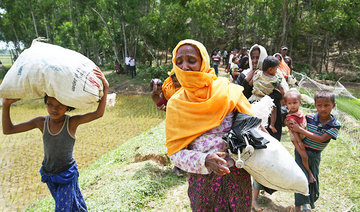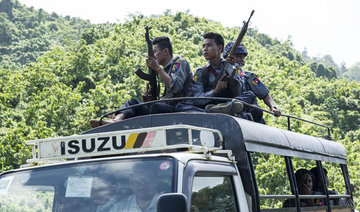COX’S BAZAR, Bangladesh: Around 400 people — most of them Rohingya Muslims and some Hindus — have died in violence searing through Myanmar’s Rakhine state, the army chief’s office said Friday, with tens of thousands forced to flee across the border into Bangladesh.
A further 20,000 Rohingya have massed along the Bangladeshi frontier, barred from entering the South Asian country, while scores of desperate people have drowned attempting to cross the Naf, a border river, in makeshift boats.
Reports of massacres and the systematic torching of villages by security forces — as well as by militants — have further amplified tensions, raising fears that communal violence in Rakhine is spinning out of control.
The office of Commander-in-Chief Min Aung Hlaing on Friday gave an updated death toll, sketching out the details of an insurgency that has escalated sharply.
“Until August 30, a large number of terrorists carried out 52 waves of attacks on security forces .... in those attacks, 370 bodies of terrorists were found and nine others captured alive,” a statement posted on Facebook said.
Fifteen security forces and 14 civilians have also died in eight days of fighting, it added.
It was unclear if the deaths of 78 militants killed last Friday in pre-dawn raids on police posts that sparked the current round of violence were included in the toll.
Bloodiest chapter
Either way, it is the bloodiest chapter yet in a bitter five-year crisis that has torn apart the northern state of Rakhine along ethnic and religious lines, displaced the Rohingya in huge numbers and heaped international condemnation on Myanmar’s army and the government of Aung San Suu Kyi.
Most of Myanmar’s estimated 1 million Rohingya Muslims live in Rakhine. They face severe persecution in the Buddhist-majority country, which refuses to recognize them as a legitimate native ethnic minority, leaving them without citizenship and basic rights.
Longstanding tension between the Rohingya Muslims and ethnic Rakhine Buddhists erupted in bloody rioting in 2012. That set off a surge of anti-Muslim feeling throughout the country.
Some Buddhists and Hindus have also fled the violence.
More than 400 Hindu residents of Rakhine crossed into Bangladesh after being attacked by armed men, officials and survivors said.
Main Uddin, a government official in Ukhiya in Cox’s Bazar, said the survivors reported that about 86 Hindus had been killed by armed groups in three villages since last Friday.
Survivors said Myanmar soldiers were everywhere and “armed people” were also burning houses and killing people.
Nirajan Rudro, a Hindu who fled to Bangladesh, told The Associated Press that masked men armed with guns, sticks and knives had attacked them and set fire to their houses.
Uddin said 412 Hindus are staying in a Hindu neighborhood near Rohingya camps in Ukhiya.
“They have been sheltered in an abandoned poultry farm there. Bangladeshi Hindus are helping them,” he said
The UN says 38,000 Rohingya have reached Bangladesh, some using overland routes and others crossing the Naf River.
Rights groups believe the true death toll is likely much higher.
They allege massacres of Rohingya in remote villages led by Myanmar security forces and ethnic Rakhine Buddhist mobs.
Fortify Rights, an NGO with a focus on Myanmar, said eyewitnesses alleged mobs shot and hacked down Rohingya villagers — including children — in a five-hour “killing spree” in the village of Chut Pyin in Rathedaung township on Sunday afternoon.
The allegations could not be independently verified by AFP as the area is off-limits to reporters.
Myanmar’s Information Committee appeared earlier this week to confirm a major security operation took place around the village on Sunday afternoon as a patrol clashed with scores of Rohingya militants.
But in a complex situation, further muddied by the swirl of claims and denials by both sides, more accounts emerged accusing Myanmar forces of killings and widespread abuse.
A 23-year-old Rohingya woman from Kyet Yoe Pyin said she had witnessed soldiers and Buddhist mobs rape and kill Muslims in her village over the weekend.
“They mercilessly slaughtered men, women and children,” she told AFP by telephone from Cox’s Bazar in Bangladesh where she has fled. The claims could not be verified by AFP.
Dangerous crossing
Desperate to reach Bangladesh, thousands of Rohingya have taken to boats — or clung to flotsam — in an effort to cross the Naf river which separates the two countries.
But others died trying. Three boats carrying ethnic Rohingya fleeing violence in Myanmar have capsized in Bangladesh and 26 bodies of women and children have been recovered, officials said Thursday.
Bangladesh border guard commander Lt. Col. S.M. Ariful Islam said at least three boats carrying an unknown number of Rohingya Muslims sank in the Naf River at Teknaf in Cox’s Bazar on Wednesday. He said the bodies of 15 children and 11 women were recovered, and it was unclear whether anyone was still missing.
The top government official in Cox’s Bazar, Mohammad Ali Hossain, said the bodies would be buried because no one had claimed them.



















